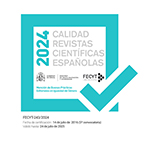Deontologia profesional: la ética denostada
Resumen
El presente artículo ofrece una discusión teórica en torno a tres debates ligados a la buena praxis del trabajo soial desde la perspectiva de la práctica profesional. El primero alude al sentido que se le otorga a la "etica" y a la "deontología profesional" en la práctica del trabajo social.El segundo debate es una reflexion sobre la necesidad de la estrucutra colegial como garante de la buena praxis profesional a través del codigo deontológico, de las comisiones deontológicas y, en esoecail, ante la reciente aparición de los Comités de ética de la Administraión. El tercer apartado gira en torno a la exigencia ede formación en ética y en deontología profesional: un requerimiento fundado en los resultados de la investigación realizada para este articulo sobre la situación de estas materias en lo planes de estudio de Grado en Trabajo social de las Universidades públicas españolas.
El método llevado a cabo para la realización del artículo ha ido la revisión bibliográfic y documental así como una investigación empírica consistente en el análisis de 30 páginas web de otras tantas universidades cuyo objetivo era valorar la situación de la formación en ls titulaciones de trabajo social en España.
Descargas
Descarga artículo
Licencia
La revista Cuadernos de Trabajo Social, para fomentar el intercambio global del conocimiento, facilita el acceso sin restricciones a sus contenidos desde el momento de su publicación en la presente edición electrónica, y por eso es una revista de acceso abierto. Los originales publicados en esta revista son propiedad de la Universidad Complutense de Madrid y es obligatorio citar su procedencia en cualquier reproducción total o parcial. Todos los contenidos se distribuyen bajo una licencia de uso y distribución Creative Commons Reconocimiento 4.0 (CC BY 4.0). Esta circunstancia ha de hacerse constar expresamente de esta forma cuando sea necesario. Puede consultar la versión informativa y el texto legal de la licencia.









